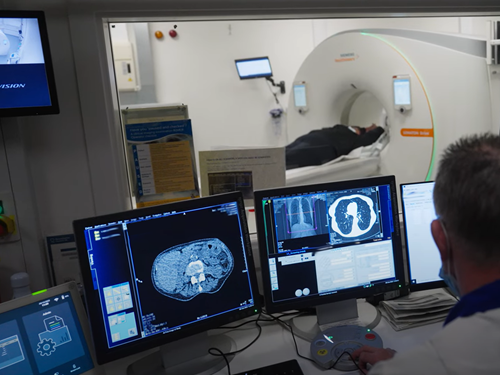UHNM leads way in worldwide lung cancer research
University Hospitals of North Midlands lung health checks are leading the way in research for early diagnosis of lung cancer through a nationwide research project which is set to be the world’s largest lung cancer data set.
The research will enable state-of-the-art developments to key software which will assist doctors in detecting lung cancer by speeding up diagnosis, reducing the need for additional investigations and ultimately will save lives.
The Integration and Analysis of Data using Artificial Intelligence to Improve Patient Outcomes with Thoracic Diseases research project (DART), is led by University of Oxford and funded through Cancer Research UK and UK Research & Innovation and aims to further improve earlier diagnosis and better outcomes for lung cancer by collating a wealth of data from the Lung Health Check programme. Of the ten hospitals that currently provide DART with lung screening data, UHNM is ranked number one, providing vital information in the form of clinical data, imaging and bloods.
In the future it is hoped that this ambitious research programme will help pave the way for early diagnosis of lung cancer around the world.
Dr Imran Hussain, UHNM Clinical Lead for Targeted Lung Health Checks in Stoke-on-Trent and Staffordshire said: “Often lung cancer is diagnosed at a late stage meaning treatment is not as effective as it could be if it were to be found at an early stage. Being a part of a research project that aims to ultimately improve lung cancer diagnosis around the world is exciting from a clinical perspective but the impact it will have on lung cancer mortality for our population will be remarkable.”
Janina Barnett, Programme Manager, of Lung Health Checks Team said: “I am delighted that UHNM is the leading trust for providing data to such an important and ground breaking research project.”
She added: “It feels exciting to know that the work we are doing will have such a positive impact on lung cancer outcomes in the future.”
The targeted lung health check programme invites people aged between 55 and 75 who are current or ex-smokers to a lung health check. An initial conversation with a specialist respiratory nurse will take place in a convenient local setting or by telephone appointment and those who have a higher chance of developing lung cancer will be offered a low dose CT scan.
The scheme was set up as a pilot and is due to be rolled as a national screening programme by 2030.
For more information on the Targeted Lung Health Check programme please visit uhnm.nhs.uk/TLC
For more information on the DART research project please visit dartlunghealth.co.uk
